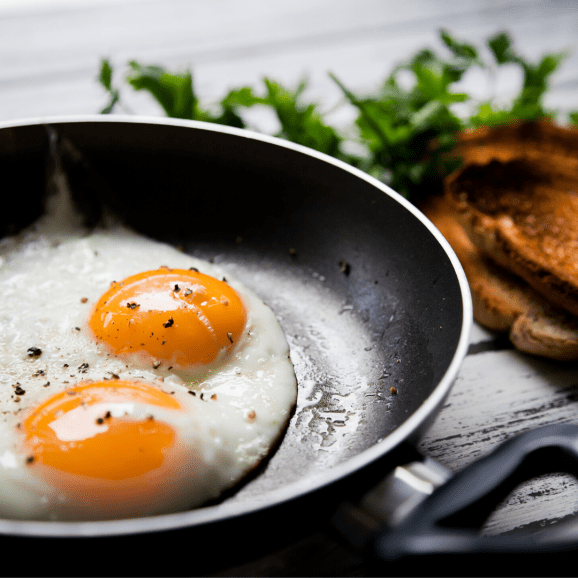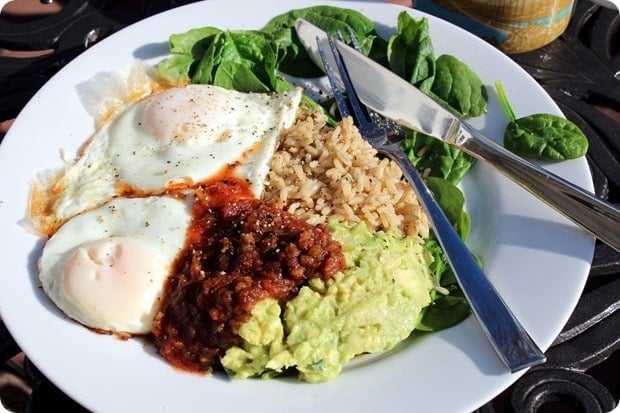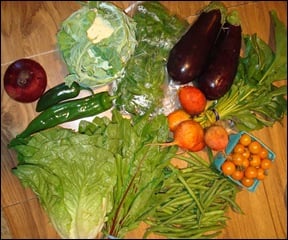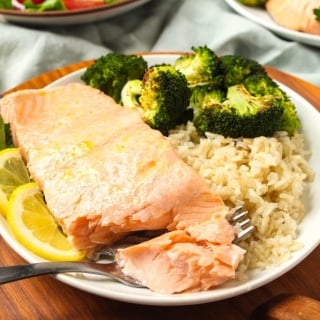Now that it’s the new year, I thought it was timely to share some of the most common nutrition myths floating around out there – and why you shouldn’t believe them.
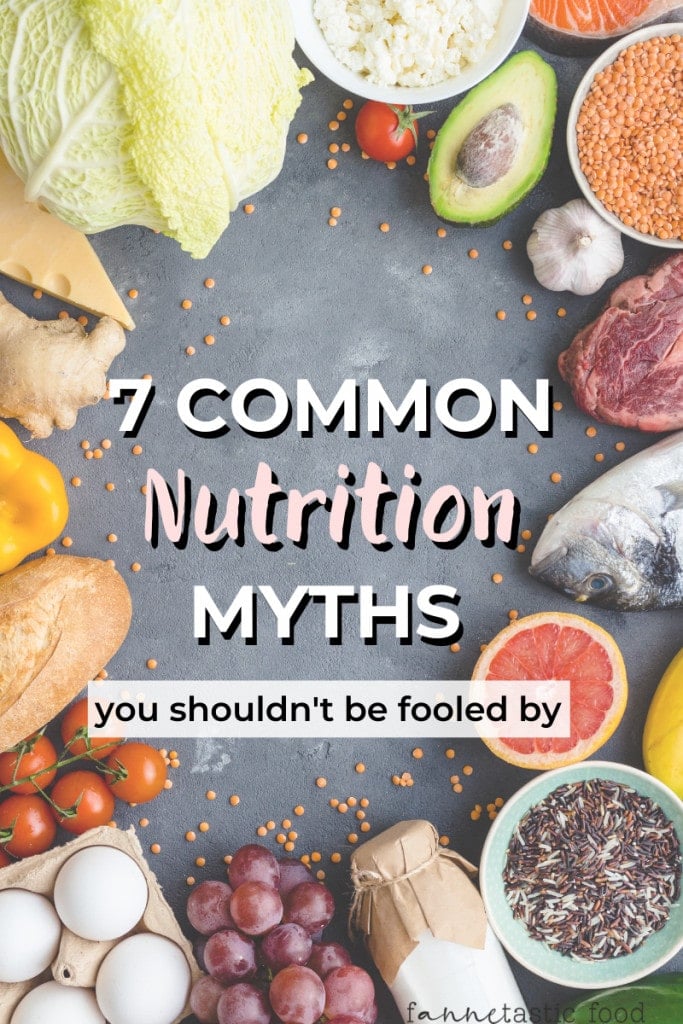
Want to save this post?
Enter your email below and get it sent straight to your inbox. Plus, I'll send you great content every week!
7 Common Nutrition Myths
Nutrition Myth #1: “It’s healthier to eat egg whites rather than whole eggs.”
Actually, the egg’s yolk is where a lot of the nutrition is!
Most people don’t know that the yolk contains over 40% of the protein in a whole egg – and more than 90% of the calcium, iron, and B vitamins. It also contains all of the egg’s fat soluble vitamins (A, D, E, and K).
Plus, that extra fat will help to keep you full and satisfied for longer than you would be with just the whites!
But what about cholesterol? Research is showing that cholesterol in food has a much smaller effect on blood levels of total cholesterol and harmful LDL cholesterol than we thought. In fact, moderate egg consumption (defined as 1 per day) has not been found to increase heart disease risk in healthy individuals. (sources: 1, 2)
The 2015 Dietary Guidelines (which finally just came out last week) have also dropped the recommendation to limit cholesterol, which I was happy to see.
Nutrition Myth #2: “Choose fat free or low fat dairy and other products.”
It drives me crazy that many people still think (and the Dietary Guidelines are still recommending) fat free and low fat dairy as a healthier option that full fat.
During the 1980s, there were a couple major reports that came out that would alter the way Americans ate. These reports kicked off the low-fat and anti-cholesterol craze that I’m sure many of us remember well (and might still be abiding by).
In these reports, decreasing saturated fat and dietary cholesterol were labeled as the single most important changes that one could make to improve their health. This translated into a national food production frenzy to create low fat diet products.
Everyone started eating eggs without the yolks, low fat crackers, low fat cookies, low fat dairy products, low fat everything. But something strange happened. Americans continued to get heavier than ever, and their overall health wasn’t improving, either.
I could go on and on about why this is (and you can read more about it in scientific terms in this post: Why the Low Fat and Cholesterol Diet Craze was a Huge Fail). But let’s just focus on one of the big points with the fat issue for now.
Full-fat foods are better than fat-free and low-fat options.
Here’s the thing: when a product is artificially made low fat or fat free, it won’t be as satisfying. This is due to the absence of fat, which keeps you full longer. It can lead to overeating, because you never feel satisfied.
Also, artificially fat free/low fat items often have sugar and other fillers added – or you’ll add more sugar yourself because it doesn’t taste good without the fat. For example, think of having a fat free latte. It needs a fair amount of sugar/syrup to taste good, right? Same with fat free yogurt.
Next time, if you are a dairy fan, try a full fat latte or full fat yogurt. You’ll notice it’s much more satisfying and you don’t need nearly as much sweet to make it good. Same thing goes with products like peanut butter. Go for the natural full fat version to skip the additives and sugar, and up the satiety factor.
Nutrition Myth #3: “Granola and yogurt is a healthy breakfast.”
Granola and yogurt can certainly be a healthy choice, but it depends on the products being used. Often granola and yogurt are really just dessert in disguise, due to the large amount of sugar found in many brands!
Look for a plain, full fat Greek yogurt for a protein punch without added sugar. Also aim to choose a granola that has less than 10g of sugar (at a maximum) per serving. Then, add fresh fruit for sweetness instead, and some nuts for healthy fat and staying power!
Nutrition Myth #4: “Multi-grain and wheat breads are a healthy choice.”
This is one of the most common nutrition myths I see – because too often, food packaging and labeling can be misleading. It’s not as straightforward as it should be!
Look for 100% wheat or 100% whole grain on the label. Unless 100% is noted, it’s likely just white bread with a tiny grain of something added – or with caramel color added to make the bread look darker.
Even better: check that ingredient list. Is it short and full of things you recognize as real food? If not, put it back on the shelf. I usually go for sprouted grain breads – better real food ingredient lists!
Nutrition Myth #5: “Potatoes are bad for you.”
While their orange cousins have been hanging out in the nutrition spotlight, white potatoes have gotten a bad reputation over recent years for being essentially empty carbs. Not true!
White potatoes are packed with fiber, which helps keep you regular and aids in feeling full. They also have more potassium than sweet potatoes! A USDA study of potatoes recently found levels of phytochemicals that rival the amounts found in broccoli, spinach and Brussels sprouts.
So eat up! I like having them roasted. 🙂 (See also: Garlic Herb Roasted Veggies.)
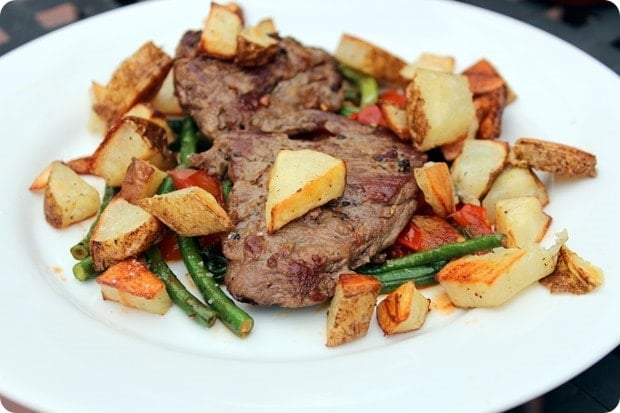
Nutrition Myth #6: “Diet soda aids in weight loss.”
Think grabbing a diet soda will help maintain your weight? Think again – several large studies have linked artificial sweeteners to weight gain. (source)
Why? The research isn’t entirely decided, but artificial sweeteners seem to actually increase appetite and contribute to sweet cravings by training taste buds to favor sweeter flavors. It may also confuse the body’s natural mechanisms for regulating caloric intake.
I wouldn’t suggest grabbing a regular soda in its place (clearly real sugar isn’t good for us, either, especially in large quantities). Instead, decrease your intake of diet sodas as well as other artificial sweetener sources, like sugar-free gum and other sugar-free products.
Another thing: artificial sweeteners might be making your stomach hurt.
Nutrition Myth #7: “Coffee creamer is a healthy alternative to half and half or whole milk.”
Take a look at the ingredient list on that coffee creamer. It’s usually packed with trans fat (here’s what trans fat is and why you should avoid it) and all sorts of other not so great additives.
Here’s the ingredient list on a vanilla coffee creamer: SUGAR, PARTIALLY HYDROGENATED VEGETABLE OIL, CORN SYRUP SOLIDS, LESS THAN 2% OF SODIUM CASEINATE (A MILK DERIVATIVE)**, DIPOTASSIUM PHOSPHATE, NATURAL AND ARTIFICIAL FLAVOR, MONO- AND DIGLYCERIDES, SODIUM ALUMINOSILICATE, SALT, CARAGEENAN.
Yeah, yikes. Stick with real milk or a non-dairy alternative like almond milk, coconut milk, or soy milk!
I hope this list of common nutrition myths has helped you sort out the truth about eating & staying healthy.
Like nutrition-related hot topic posts? Here are some others you might enjoy, too:
-
- How to Get Rid of Sugar Cravings
- Simple Tweaks for a Healthier Life
- How to Stay Healthy While Working in an Office
- What Oils To Use When (e.g. high heat cooking vs. baking vs. salad dressing)
- How to Interpret Blood Test Results
- How to Add Flavor to Meals Without Salt or Sugar
- Trans-Fat: What It Is & How and Why To Avoid It
- How to Eat for Running: Top 5 Nutrition Mistakes Made by Runners
- 10 Immunity-Boosting Foods for Flu and Cold Season
- Quinoa Nutrition Fun Facts and Recipes
- What’s the Deal with Sprouted Grains?
- Why This Registered Dietitian Eats More Fat (guest post written by me on my friend’s blog about the science and history behind low fat diets – and why I don’t recommend them)
- Health Benefits of Fermented Foods (guest post)
- 4 Myths About Eating Gluten Free (guest post)
- Why You Should Eat More Omega-3 Fats (guest post)


